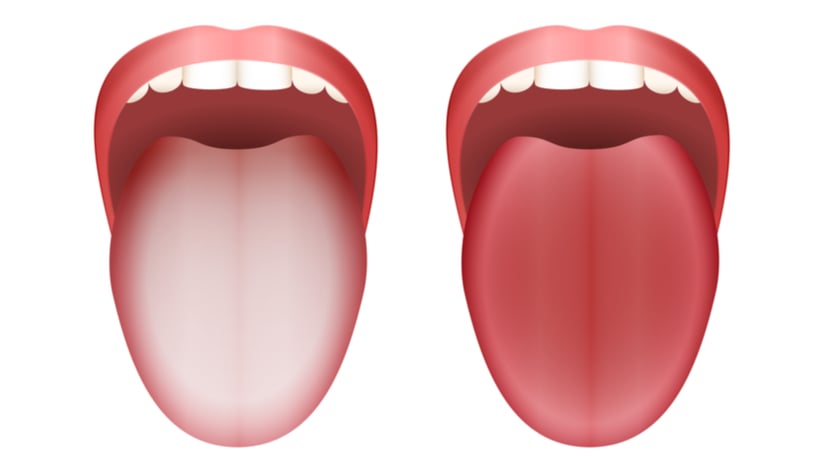No tongue is the same — we all have different bumps, patches and spots that, most of the time, don’t point to anything serious. However, sometimes, certain sensations or physical characteristics in your mouth might indicate an underlying concerning medical condition. Read on to learn what your tongue might be telling you, and when you should start seeking treatment.
White tongue: Oral thrush or lichen planus
According to WebMD, creamy white patches – described as the consistency of cottage cheese – on the tongue might indicate oral thrush, a fungal infection. The infection can be caused by certain medications and illnesses and can be treated using prescribed antifungal mouthwash or lozenges.
Another reason for a lacy, white patch might be lichen planus, a condition where your immune system attacks the tissues in your mouth. The Mayo Clinic explains that while the condition tends to go away on its own – after a couple years or so – certain medications can help with the itching and discomfort.
Red tongue: Vitamin deficiency
Does your tongue look like you were just sucking on a strawberry lollipop? If so, you could be experiencing a vitamin deficiency, particularly of vitamin B12 or iron. Your tongue needs both of these vitamins to mature papillae, those little hairs on your tongue. Without iron and B12, your tongue loses the papillae, giving it a glossy appearance. Check in with your doctor to see if you’re deficient in these essential vitamins and if you should start taking supplements.
Hairy tongue: “Hairy tongue”
Yes, hairy tongue is a real (but not so serious) condition. According to the American Academy of Oral Medicine, the abnormal coating on the top of the tongue, and is actually quite common. It happens when there’s not enough stimulation near the top of the tongue, resulting in a buildup of the protein keratin. The accumulation of this protein causes the papillae on your tongue to grow long, giving your tongue a hairy appearance. Luckily, it’s temporary, and shouldn’t be a cause for concern.
Burning tongue: “Burning mouth syndrome”
A burning tongue could indicate a hormonal change if you’re postmenopausal, or a sensitivity to certain kinds of toothpaste or acidic foods. However, chronic or recurring burning sensations, accompanied by a metallic taste might point to burning mouth syndrome. This condition affects the nerves in your tongue and unfortunately appears without a direct cause. However, meeting with your doctor can help pinpoint a possible cause and get treated accordingly.
Bumpy tongue: “Geographic tongue”
Luckily, those hills and valleys on your tongue point to a very common and harmless condition. According to the Mayo Clinic, the bumps indicate geographic tongue, an inflammatory syndrome affecting the tongue’s surface. In geographic tongue, areas of your tongue lack papillae and appear smooth, making your tongue look like a bumpy terrain. Although most people with geographic tongue don’t experience any symptoms, some people feel a heightened sensitivity to certain spicy or acidic foods. However, the condition is harmless and usually resolves on its own.
Sources:
https://www.webmd.com/oral-health/ss/slideshow-tongue-your-health
https://health.clevelandclinic.org/what-your-tongue-can-tell-you-about-your-health/
https://www.mayoclinic.org/diseases-conditions/lichen-planus/diagnosis-treatment/drc-20351383
https://www.aaom.com/hairy-tongue
https://www.mayoclinic.org/diseases-conditions/burning-mouth-syndrome/symptoms-causes/syc-20350911
https://www.mayoclinic.org/diseases-conditions/geographic-tongue/symptoms-causes/syc-20354396
https://www.rd.com/health/conditions/tongue-disease-signs/



